Evergrande: Don't mistake the symptom for the cause
Evergrande is not a rogue operator. Evergrande is merely the largest and most indebted property developer in a country full of large, indebted property developers. How China deals with Evergrande and its debt problems is critical for the next decade of Chinese growth, commodity prices and inflation globally.
We wrote about the urgency four months ago, suggesting that we thought the issue would come to a head in the next three to six months. And it has.
Some background first.
Urbanisation is the key.
China has moved an incredible number of people to cities in the last twenty years. In recent years it has been around 25m people per annum.
But the problem is demographic:
- China's population growth is very low and likely to keep falling. It is expected to be negative before 2050.
- There are already almost 65% of people living in cities, up from 15% in the 1970s
Most countries top out in the low 80% urbanization levels.
When will China slow its urbanisation?
There are 25 million people per year moving to cities now. A smooth fall like we have seen in other developing nations would see 20 million people or less moving to cities by 2025 and falling over time.
Or will it be a sudden stop? i.e. will China try to keep moving 25 million people to cities until no more people are left? The difference in the number of people is stark:
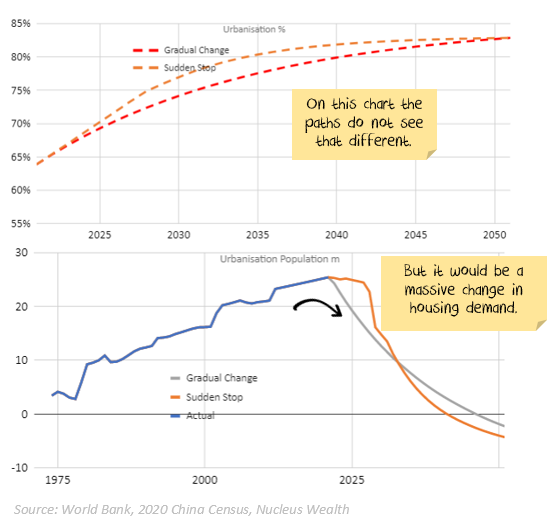
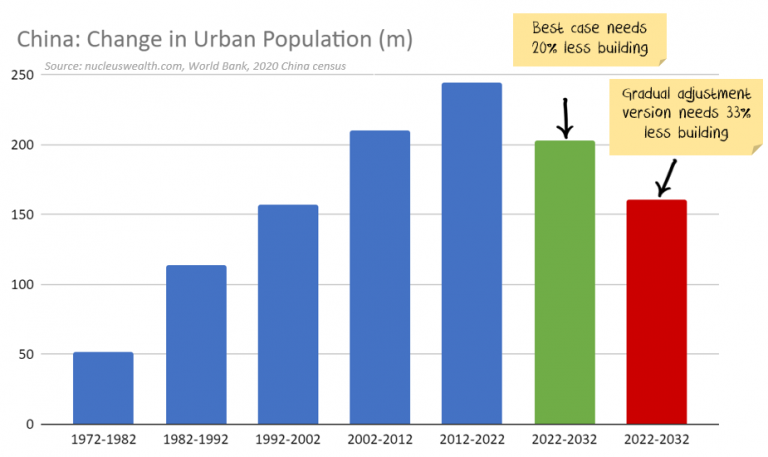
I don't know which it will be. The main point is there is structural downside risk to the number of buildings needed in either case.
Empty Apartments
Estimates are that around 20% of Chinese apartments are unoccupied. This is about 50-60m apartments.
Chinese construction numbers don't add up, which makes analysis difficult:
- New starts have consistently been around double the completions.
- This means that the number of apartments "under construction" keeps growing, suggesting something wrong with the starts number.
- However, sales are about the same as starts.
Probably a Chinese habit of building an apartment but not installing the fixtures (painting, kitchens, electrical etc.) is partly to blame. i.e. many investors own an unfinished apartment. When they rent it or move in, they can install the fixtures and not worry about depreciation in the meantime.
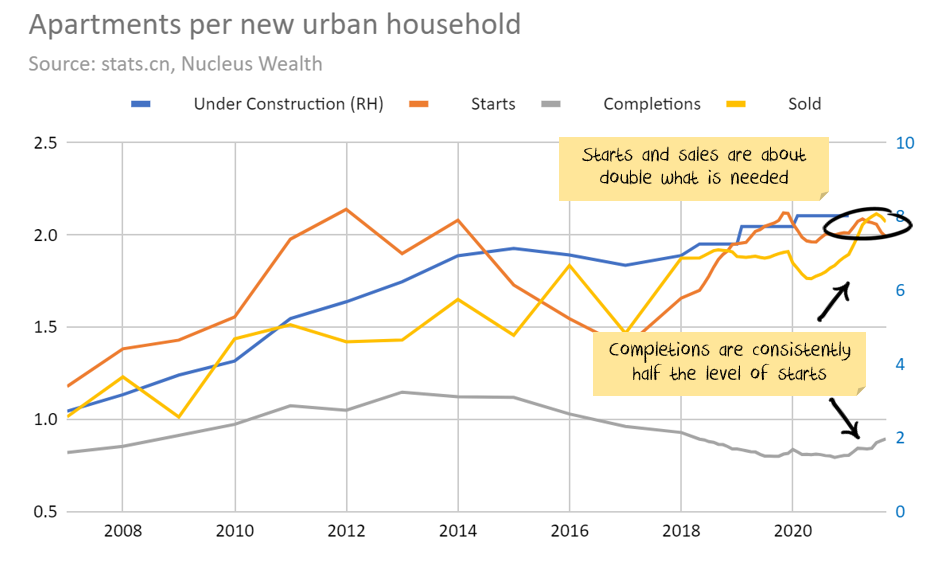
Additionally, apartment sizes are growing while people per household is shrinking. There are a lot of moving parts. What it does mean is:
- The number of apartments completed seems to be about the same as the number of people moving to cities.
- The number sold and started appears to be about double the number of people moving to cities.
- There is enough housing stock currently under construction to cater to about nine more years of demand.
- There are enough empty apartments to cater to another 4-5 years of demand.
The net effect is China can easily afford to slow down construction for years (decades?) without causing problems for its urbanisation plans.
This is not China's first rodeo.
This is the fourth instalment of Chinese attempts to rid itself of its troublesome property development sector. The first began in 2011. It was ramped up again in 2015 and 2019. Each time, the failing growth that followed has spooked policymakers into more stimulus.
China keeps returning to this program for one reason. Its property market excesses are the key threat to its economic development path. Property is both the source of its enduring catch-up growth and its doom if allowed to run too far. No other Chinese sector misallocates capital and kills productivity on such a massive scale. If not restructured, it will drag China into the middle-income trap of weak income, stalled growth and declining efficiency.
There is now a short-term catalyst.
In 2020, China announced lending conditions on property developers called three red lines. These conditions are now being enforced. It is trying to slow the property lending market, which has grown around 600% over the past decade. In addition, there have been dozens of other minor changes to slow credit to the property sector.
So far, it is working. The Evergrande problem problems show it might be working too well.
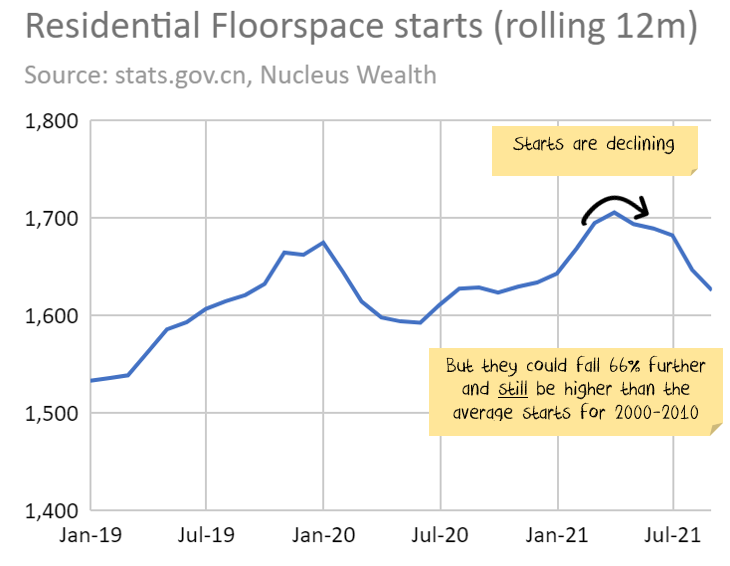
Note China will once increase credit again to the sector in the future. It is not a one-way ticket.
However, the long-term trend is down. The downtrend will be punctuated by bursts of credit to strengthen the Chinese economy when it weakens.
The question is whether Chinese authorities will fold quickly this time or want to see more reform before relenting. I am expecting the latter.
Evergrande but one of many
Evergrande is significant partly because of how big it is. But, more importantly, whatever solution is applied to Evergrande will need to be applied to hundreds of other property developers.
The total value of listed companies globally in the Real Estate Developers or Homebuilding industry is a little under USD1 trillion. More than half of those companies are listed in China or Hong Kong. China spends far more on its property sector than any other country:
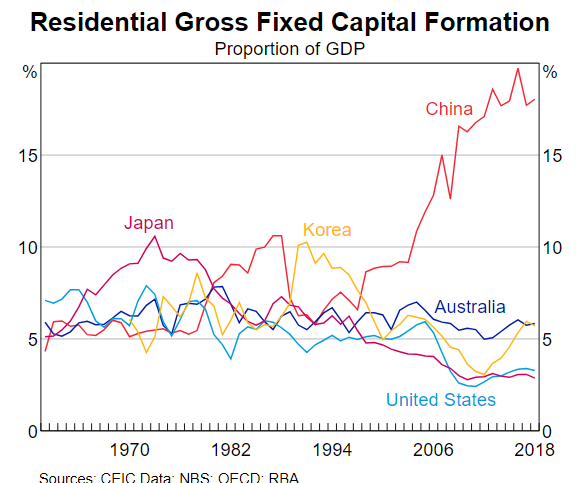
Plus, on average, Chinese and Hong Kong property developers have 3.5 times more debt than developed market companies.
China needs to restructure away from property. It knows what the problem is. But it is not a small problem. China could, in theory, bailout Evergrande tomorrow. Hell, it could bail out the entire sector. But the cost would be astronomical.
Three areas to watch
With so much of the Chinese economy based on the housing market, China can ill-afford to abandon the sector to market forces. A steady transition appears to be the intention, but the risk is that circumstances move too quickly. The dangers are:
1. Credit locking up in the property development sector.
This is happening right now. The average yield on dollar bonds issued by junk-rated Chinese companies has doubled to around 16% since the start of the year. Recent signs are not good.
We are expecting to see some sort of government announcement in the short term to reduce the stresses:
- If there are no meaningful measures, then we are looking at a full-blown financial crisis. Very negative for stock markets, particularly Australia.
- More likely, steps will be implemented to help the better companies but not let up on over-indebted companies.
- At the bullish end, China could over-egg the response, opening up the credit taps. This scenario would be short term positive for stock markets, particularly commodities, subject to the below risks.
2. Property buyer confidence
China has some of the most expensive housing in the world relative to income. Should buyers lose faith in the value of properties, then a house price crash could result. This could occur even if the first issue is solved. Which would leave developers in a much worse position.
There are nascent signs that Chinese property buyers are spooked. Watch this space.
3. House price wealth effects
This is the problem facing almost every country. High property prices increase inequality, reduce economic growth and damage productivity. But all of those are longer-term problems.
The short term effect of rising prices is to increase spending and consumer confidence.
And politicians love short term gains at the expense of long term losses. Falling home prices offer the opposite.
The problem is worse for China than elsewhere. Both homeownership and investment in real estate are much higher in China than in most other countries.
Net effect
Transition away from a real estate centric economy is a good thing for China! But the transition will be difficult.
This is their fourth attempt in the past dozen years, having lost their nerve on three prior occasions. Odds are that China will lose their nerve again. But, maybe they won't this time. And more importantly, if they will push things at least as far as we saw in 2015 before relenting then commodity prices have got a lot more downside.
Never miss an insight
Enjoy this wire? Hit the ‘like’ button to let us know. Stay up to date with my content by hitting the ‘follow’ button below and you’ll be notified every time I post a wire. Not already a Livewire member? Sign up today to get free access to investment ideas and strategies from Australia’s leading investors.
1 topic

